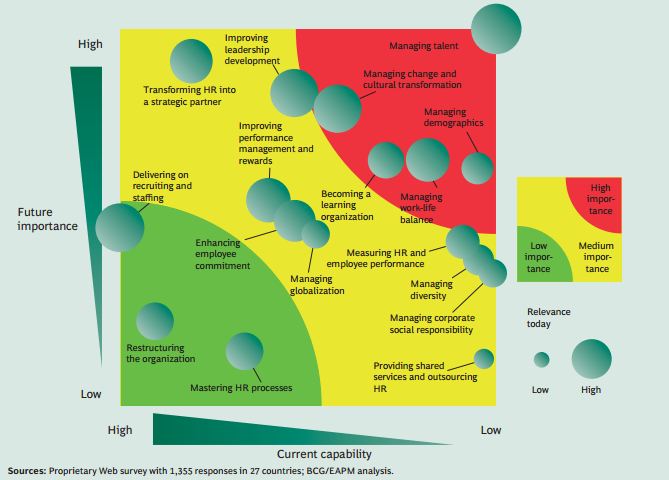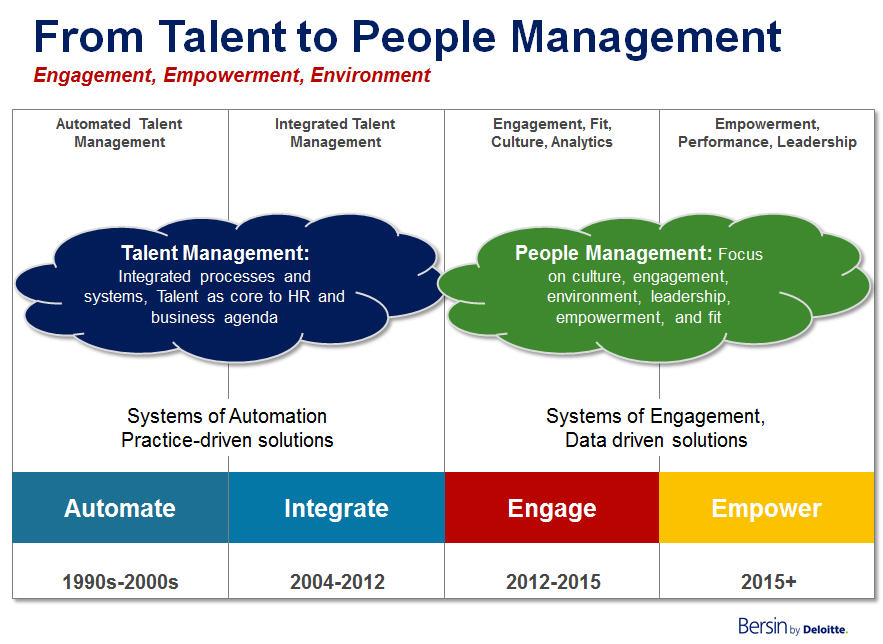The HR functions are at a conjugation point and it has been believe that in the coming years there will be significant transformation of the functions. As the current functions are not connected or flexible to business requirements and have no consolidated vision of talent capabilities there is a need of evolution. There are off course some key trends that will effect this transformation. Talent management is one of them for sure. Across the developed and emerging markets there will be a shortage of skilled and appropriate talent. Businesses cannot deliver their best as they are lacking the right talent. Hence the future HR functions would create significant value for the business, given current and future business trends.
Skills gaps are increasing and HR would continuously make ensure that their organizations have the right talent. HR would need to quickly tap skills when they’re needed. HR would transform to adapt to a more global world, supporting new talent sourcing strategies to match talent, and acquiring new management methods, such as encouraging mobile workforces across geographical barriers.
HR would adopt risk management strategies covering everything from protecting confidential information and data, to risks associated with hiring or turnover of talent. Technology, including social, gamification, cloud, mobile, big data and simple applications, is transforming how people take away their daily work and how HR supports them in that attempt.
Instead of depend on solutions dictated from the top of the organization; organizations would be encouraged with knowledge workers who harness social media to create solutions in conjunction with each other, thereby radically disrupting organizational structures, and hierarchy and job titles. As the world becomes increasingly unpredictable, organizations that can adapt to changing business conditions will outperform the market. And HR could reshape itself so that the functions become the critical driver of agility.
HR need to provide the new thinking and deep insight to attract, organize, motivate and develop the right people for the business and for this need to build the high-performing HR functions to support business goals.
The challenges doesn’t end here, there are various other challenges that the industry is likely to face in the coming years. Let’s see the major challenges for HR professionals for the coming years:
Attracting top talent to organization:
The recruiters need to negotiate themselves before the candidates so that they can recruit top talents for the organization. It is now very important as the talent shortage is making every organization aim to bring in the best talent. Many HR professionals perceive that there is a need to construct a corporate culture that will attract the best candidates to the organization.
Retaining and rewarding performing employees:
More than half of the HR professionals believe that in the next coming years, major struggle will be to retain the talented and performing employees. Moreover, it is going to become even worse to recognize and reward the actual performers as the competitiveness is growing and that needs more collaboration to establish dedication among employees.
Developing future leaders:
With growing possibilities for top performing employees, companies are in a dilemma over how will they build the future of the organization. The rising rate for employee retention is giving HR really a difficult time with implementing practices to enhance employee engagement and make them stay for long time in the organization. HR professional have a critical concern over developing next generation leaders.
Career development opportunities for employees:
If the company takes employee career development seriously and aim to work for it as well by providing sufficient and equal opportunities, then definitely they can over-come their competitors who are also looking for talented likelihood for the similar jobs. Professionals have indicated this as a big challenge and important factor for increased attrition rate.
Providing healthy and cooperative corporate culture:
Corporate culture has become one of the deciding factors as culture defines the proper way to think, act and behave within an organization. Raising market demands and competitions makes companies work more to grow, inflate and sustain within the unpredictable conditions. Hence directly or indirectly it affects the organizational culture, as the people are sometimes burden with work that may affect the healthy work culture. On the other hand to impact culture, HR professionals must work with leaders of the organization to understand what the organization considers proper with regards to how people think, act and behave to provide a collaborative corporate culture.
Flexible work arrangements:
The upcoming generation of employees so called “Millennials” emphasizes on working in flexible structure and the main concern must be kept on providing results and not on working in a traditional office hours. This actually does not interrupt the company discipline, it just allows individuals to work the way they want and reveal better productivity. HR Professional believes that this can be a wining factor and provide an improved work life balance to the employees.
Transparent work culture & open leadership:
There is a huge expectation from the employees over it; but it has been seen rarely among organizations and that’s a true fact. Most of the organizations fail to establish a culture of clear and transparent work communication or open leadership that somewhere influence the employee and his dedication to work. It has been fairly indicated that if communication barriers are removed, then the organization can attract more talents.
Better compensations:
Monetary benefits always matters and if the companies have the competent performers, they need to take good care of the compensation they offer to them. Now a day’s employer are largely taking on this part with awarding employees profitable reward packages and attracting more talent towards them. May be it’s not the most important component but surely it matters.
Raising talent investments:
HR professionals indicate that one of the biggest challenges for the coming years will be acquiring talent and improving human capital investments. Ongoing further, one thing is clear that the most difficult part is retaining good employees and attracting best talent on the top. For this HR professionals require to develop the talent management strategy that can effectively contribute in attracting, retaining and rewarding top performing employees.
Boston Consulting Group and European Association for Personnel Management had also done a research and came across with the key challenges in 2015 for the future of HR in Europe.
According to them companies in Europe will face five particularly critical HR challenges in the near future:
- Managing Talent
- Becoming a Learning Organization
- Managing Work-Life Balance
- Managing change and culture Transformation
- Managing Demographics

Talent shortages has been threaten, both in Europe and in the new market abroad, and the companies must take steps now if they hope to address these shortages and avoid disaster. As the talent in the Europe is graying, European countries must take care of two different risks: the loss of scope and knowledge as workers retire and the ageing of the workforce.
On the other hand organizations must prepare their employees to handle with the complexities and accelerated speed of an increasingly global economy. This effort is particularly important since some national education systems are failing to generate new talent with the skills that they will required keeping pace. In such environment, companies will only succeed based on their involvement with employee training to fulfill their business strategy.
As the border between personal and work life is not clear, employees are increasingly selecting jobs based on how well they can help the individuals achieve work-life balance or promote personal goals and values. In order to attract and retain highly talented people, organizations will therefore need to offer flexible work arrangements. They will also need to take care of the employee’s growing desire to derive a sense of greater motivation from their work.
As companies hire talent from around the globe and enter new markets with increasing speed, managing corporate and cultural change will become a critical potential. Already many research showed, executives expect their company’s HR functions to develop tools and methodologies that support line managers in communicating to employees; the need for change and enable them to bring about such change and transformation.
All these studies, analysis and the similar results simply shows Talent Management should be on the top priorities in coming future for the organizations. As the war for talent rages on and with the market for quality talent becoming increasingly competitive, executives are making their company’s human capital a top priority. HR leaders need to have more information at their fingertips than ever before and really need some great tools and solutions to find, hire and retain the best talent. There are several important factors to keep in mind when choosing the right talent management tools, according to industry experts.
Talent management tools won’t resolve employee recruitment, retention and other issues by themselves. Companies need to develop a clear plan to navigate talent management pitfalls. Social media, the cloud, mobility and analytics are changing talent management software and the way companies use it.
According to Bersin and Associate with so many vendors in the market and the ERP providers offering talent management software, it’s common for companies to buy software first, and then later figure out how to use it. Today more than 40% of the companies buying HR software are focused on “making it easy to use” and integrating heterogeneous systems, not “solving particular talent problems.”
As we reflect on the last ten years, it’s clear the world has changed. While integration is still a big topic in HR and most bigger companies are moving toward building more integrated HR technology strategies, this whole market has shifted. Integration of the core HR processes, once considered the nirvana of talent management, is not the top of mind issue today.
In fact today, whether we like it or not, everything in HR is connected. Since those early days we now have ubiquitous social networking, total connectivity across all people and systems, and a porous talent system that leaks and collects data from the outside world like never before. Our recruitment, employment brand, and even employee engagement is extended into the public internet, so our internal systems and data no longer stand alone.
Companies still want integrated HR systems, but what they don’t want is complex, integrated ERP software that makes everyone’s life more complicated. In fact, they want life to be more simple. More than 40% of the companies we just surveyed in our upcoming Human Capital Trends study are embarking on projects to “simplify the work environment.” 47% of the people we surveyed who are buying new HR software systems cite “ease of use” and “integrated user experience” as one of their top two buying criteria.
So as per Bersin and Associate , in HR, start to think about employees as “people” – and this is why more and more companies are starting to rename their HR organizations things like “People Operations” or “People Management.” Sure we have to do HR administration, but ultimately our job is to make sure “people” are engaged, trained, in the right jobs, aligned, and supported.
If we start to think of their employees as “people” or consumers , then all of a sudden we think about “talent management” in a new way. It’s not just a way to integrate HR processes, it’s a series of strategies, programs, investments, and promises that make everyone’s life, work, and career better for them .

So the Talent Management needs to transform to People Management. With more engaging people, simplifying the environment, making the work easier. People management focuses on empowering and improving performance everywhere with continuous learning and continuous feedback processes. The focus is definitely on creating highly engage workplace and productive work environment. While Talent scarcity is still a problem, but engagement, empowerment, and environment are now the real issues companies are facing. So this transformation is necessary to overcome all sort of challenges in this area. As the talent management industry is changing with Social, mobile, analytics and cloud-based technologies, we also need to make sure that the Digital Transformation strategy must fits with these changes on Talent Management.


